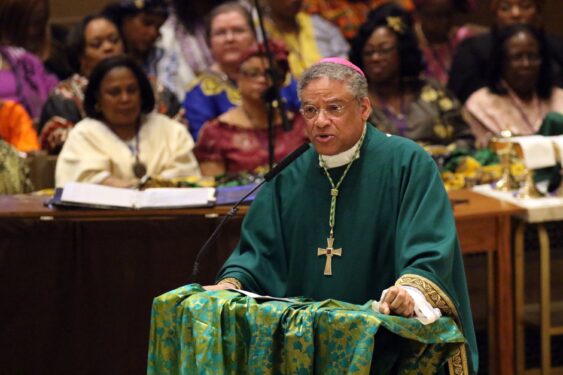
WASHINGTON — The Catholic Church has a role to both promote racial healing and help dispel the fears that many people have of those who are unlike them, said Chicago Auxiliary Bishop Joseph Perry, who was recently named chairman of the U.S. Conference of Catholic Bishops’ Ad Hoc Committee Against Racism.
The Church has to “work to dispel what you might call the visual and emotional dissonance certain people suffer when people of color or different backgrounds or religion enter their space — the subtle thing that’s been sown in our consciousness over a millennia, if not more,” he said.
The bishop said African American, Latino, Asian, and Jewish communities and people from the Middle East “remain in the forefront of our consciousness in the work of the committee.”
Bishop Perry, a 75-year-old African American bishop, was appointed to lead the bishops’ anti-racism committee in early May by Archbishop Timothy Broglio, USCCB president and head of the U.S. Archdiocese for the Military Services.
The bishop, born and raised in Chicago, succeeds Archbishop Shelton Fabre of Louisville, Kentucky, who was named to head the committee in 2018 and had requested a new chair be named after his appointment to Louisville last year.
Bishop Perry, chairman of the USCCB Subcommittee on African American Affairs, has been a part of the bishops’ Ad Hoc Committee Against Racism since it was formed in 2017 to address racism in the Church and the wider community and to work toward eliminating it.
In 2018, the committee’s pastoral letter against racism, “Open Wide Our Hearts: The Enduring Call to Love,” was approved by the body of bishops and the committee promoted it in parish listening sessions around the country.
Bishop Perry said these sessions stopped during the pandemic, but the committee has received several requests to start them back up later this year.
From his own experience at some of these sessions, he said they were very emotional as people shared how they experienced racism, how it continued to impact them and how they were “looking to the Church out of a sense of hope and healing.”
He acknowledges the Church still has work to do, but he has also seen some progress.
“These are interesting times. It seems like things continue to arrive at our desk and spiral,” he told The Tablet, referring to a cultural examination of previous situations and historical events and efforts to understand their impact, which, in some cases, involves removing names and monuments.
It can also mean a deeper dive into archives and records, such as what is currently happening at Jesuit-run Georgetown University in Washington, in its efforts to make reparations for its 1838 sale of enslaved persons that helped finance the school’s operations.
The bishop said the ad hoc committee offers advice to those trying to address these types of issues.
When asked about the recent three-year anniversary of the death of George Floyd — killed in police custody in Minneapolis and whose death sparked protests for racial justice nationwide — Bishop Perry said the idea of racial reckoning, particularly highlighted after Floyd’s death, is discussed now in ways it never was before.
He said Floyd’s death was “an awful incident that should not have happened.” He also said it “really hit people on a human level,” noting there was a “human empathy” expressed around the country and the world at the time in response to what happened that crossed racial and ethnic lines and was something he found to be both inspirational and affirming.
He said efforts to combat racism in civil rights legislation and court decisions is one side of the battle but the other work, that the Church is interested in, speaks to the “notion of personal conversion and societal renewal” that is stressed in the “Open Wide Our Hearts” pastoral.
As he puts it, this work is about evangelizing and affirming human dignity.
Immediate work on his agenda includes joining fellow bishops at the spring meeting June 14-16 in Orlando, Florida, where he hopes to review what the committee has done so far and find out what the bishops are experiencing in their dioceses and “then we’ll go from there.”
He will also be attending the National Black Catholic Congress July 20-23 in Maryland, an event that takes place every five years. Its first congress in 1889 included a Mass celebrated by Venerable Father Augustus Tolton, the first U.S. Catholic priest known to be Black.
Bishop Perry is the postulator of the sainthood cause for Father Tolton, born into slavery in 1854 and one of six current African American causes for sainthood.
The bishop said the canonization of any of them would “position African American Catholics alongside Anglo Catholics, Catholics of European descent, who have their saints and heroes, who have modeled what it means to be Christian in the midst of suffering and some really awful things that have happened over history.”
He said it would also “dispel the myth that somehow African American Catholics are something of an anomaly in the Church, which is not true.
“It would cure some of that ignorance, ” he added.
